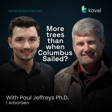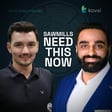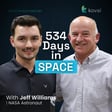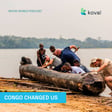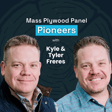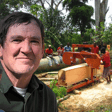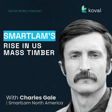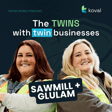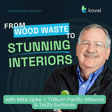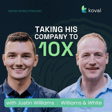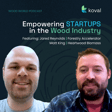Reunion with Andy Flack
00:00:00
Speaker
In today's episode, Vadim returns to catch up with Andy Flack from Homeland Properties after a couple of years since working together on a video for Andy's company.
Timberland Business and Carbon Credits
00:00:09
Speaker
They dive into the business of timberland, carbon credits, and what to consider when buying land.
00:00:15
Speaker
With over 39 years of experience in consulting on more than a million acres of land sales, Andy shares valuable insights on how landowners can profit while preserving natural resources.
Introducing the Grounded Podcast
00:00:27
Speaker
Whether you're interested in sustainable forestry or making smart land investments, this episode has plenty of practical tips you won't want to miss. It's like we're arriving here to the, you call it the bunkhouse. Excited to see this.
00:00:46
Speaker
Well, welcome back to Grounded, the Homeland Properties podcast.
Vadim's Background and Mission
00:00:49
Speaker
ah So today we're featuring Vadim Kovalev with Vadim, his company helps ah grow businesses in the wood world. Vadim produced our company video for Homeland Properties, a timeless video that we very much appreciate. then think highly of, and hopefully we'll do another one of those one of these days. But ah for today, we want you to tell us a little bit about yourself and then what you do. I'd be happy to. Thank you so much for having me. Excited excited to collaborate and join you on your podcast. Exactly.
00:01:28
Speaker
Well, my name is Vadim, like you mentioned. I go by V, just simpler that way. um The company I founded years ago is called Koval. And you asked me earlier, what does that mean? it stands It's the same root in the Slavic language. You have the blacksmith, and Smith specifically is the same as Koval. So Kavat in the Slavic language, Ukrainian language. right is Smith. So the thought was, we're smithing things in a digital realm. You know, there's, I've been to back up a little bit. You know, my my parents immigrated to the States when I was four or five years old. I grew up in the Northwest, fell in love with nature, with the trees, and was raised in the Northwest. So I learned how to
00:02:17
Speaker
you know I went to kindergarten. I went to public education. But parallel to that, I was also getting ah educated in how to read, write, and speak Russian. So my family escaped communism. um My grandfather was you know served jail time in the gulags during Stalin time for well you know being a believer. And so you know my parents were persecuted all the way through the 90s, so they escaped. And so with the context that I have, Andy,
00:02:46
Speaker
man, I wouldn't be where I am today without the Lord. And so I'm out there, you know, he's given me the opportunities, opening the doors. So I want to get out there and share that
Texas Visit and Business Interactions
00:02:56
Speaker
God is good and wood is good. That's my message. That's great.
00:03:00
Speaker
Well, tell us a little bit about, you know, ah what you've been doing lately and why are you in Texas right now? Why am I in Texas? Listen, I got a lot of friends in Texas, so over the weekend I was hanging out with your friend Kelvin and the whole steely lumber company Steely Lumber Company. That's it. So we did a production for Steely Lumber Company and that's, I believe, how we met. That's correct. And so, you know, man, Kelvin Steely has a wealth of knowledge about lumber and Just his story, man. like So I was over there just fascinated with him years ago when I met the guy. And so just was able to spend some time with him. Chris and Emily D'Ameliano are our friends as well. Chris today runs as a general manager over the Steely Lumber Company. ah The other reason I was in Texas was I was up in Dallas interviewing these guys who are PhDs and scientists who are studying you know all kinds of natural, the the nature the nature on the planet Earth.
00:03:59
Speaker
geologists and ah biologists and guys who are physicists PhDs that are going super deep and following the evidence. I would like to say that they're super open-minded meaning they look at the evidence and don't start with the premise of God can't exist and let's go interpret the evidence which leads to all kinds of crazy stuff. But they're like, hold on a second, let's look at the evidence. was you know is Is the Bible truly true? And like I asked them point blank after all this research and stuff. And Dallas, I was like, guys, is there anything that you know you've seen in geology all over the globe that this proves anything that's in the Bible? And they say, no, we we haven't found. And they're going really deep, Andy. So you should definitely check out my friends at
Productions and Sustainable Practices
00:04:43
Speaker
ICR. It's the Institute of Creation Research.
00:04:45
Speaker
Yeah, you told me about that. I'm looking forward to looking into that some more. That's that's very interesting. Well, so how we found you, of course, you said you did a production for Steely Lumber Company. And I've seen, you know, other productions that you've done for in the wood industry, especially in the sawmills and things like that. So Because our company is heavily based in in East Texas and we deal a lot in forest land and we're involved in in conservation and preservation of the forests and ah big advocates and supporters of the Texas Forester Association and ah other landowner associations like Southwest Piningwoods Landowner Association.
00:05:26
Speaker
and In our business, we're dealing with a lot of timberland sales in real estate. and then We also sell those lands from these big companies that own them to individuals that want to have their own personal forest. That's how you and I overlap in in terms of the wood business, like you said, God is good, wood is good, right? So ah that's how we came together and we've seen some of your other productions, you know, tell us a little bit more about maybe some of the, a couple of the interesting ones you've done that are based on forestry.
00:06:01
Speaker
Sure, yeah, happy to. Well, let's start right there with Steely Lumber Company. I think that was an incredible incredible opportunity for us to collaborate with a Steely Lumber Company. they do They've got a multiple businesses. Sure, they've got the Sawmill, but your friend Kelvin,
00:06:19
Speaker
is involved in logging and that was his background and forestry and then ah the sawmill, of course, and taking all those residuals and making sure that nothing goes to waste. That's correct. They've got a pellet plant, they have a landscaping company, all those other things. So companies come to us and they say, hey, Vadim,
00:06:39
Speaker
you go around the world and you work with two groups of companies. Specifically, if we put them into two buckets, the first bucket is all companies who are involved in the wood product supply chain. It could be all the way upstream to land and forest management, then you've got harvesting, logging operations, then you go into a sawmill. typical and Then from sawmill, there's a lot of value streams. You've got you know folks, of course, lumber for homes, you've got pulp and paper for I mean, everybody uses toilet paper. So like, you know what I mean? Wood is just everywhere in wood products. And then there's a lot of value streams, furniture and all kinds of cool things.
Sustainable Forestry and Public Education
00:07:15
Speaker
And then so that's that's the wood products manufacturing companies I call them. Right below them is a whole network of companies that I used to work for. So my background is engineering. I was a very technical guy.
00:07:25
Speaker
I went around the globe, Andy, and my job was to help these companies optimize their production. So what that means is I was part of the team who invented a 3D scanner, and there's a patent. I'm listed as the main inventor on this on this patent. And so the cool thing is I got to be very deep, very technical with sawmills and wood products manufacturing companies across the globe.
00:07:51
Speaker
The way I like to position myself is, look, if you zoom way out and you look at the Earth, wherever there's green on the planet, those are probably trees, and there's people there taking the forest, harvesting, and using it to make you know lumber, to make construction materials, and ah furniture and et cetera, but also All kinds of different things, right? So that's a little bit about if you zoom way out, but if you really get back to it, a great example of what we've done is, uh, your friends at Steely Lumber Company, you know, I'm really proud of that production. Really proud of what they do. This is close to me, close to my heart. And so what I'm about to say, it comes really truly from, from my heart. I feel like though the world, the world's got it kind of wrong.
00:08:40
Speaker
a lot of people A lot of people out there see a log truck coming by the highway. They think of guys like Kelvin and and Steely Lumber, hey, these guys are the ones that are deforesting the planet. well it's like And so there's a logical fallacy that people make, which is a tree, when it stands, is you know giving off oxygen and providing shade and natural natural habitat to all these critters, which is true. And then the logical fallacy is, well, if you cut that tree and it falls, that's a bad thing.
00:09:16
Speaker
And I could get into all the weeds of all that, but it doesn't stop there. This is a crop and you can listen to Kelvin talk and all these guys. So that's really what drives drives me is that we're on a mission. Our business is that it's really a simple mission. It's to improve the lives of the people in the wood industry globally. Correct. Well, I mean, we're, we're cutting trees, but we're planning more than we're cutting.
00:09:41
Speaker
And we've gone you know more to a paperless society. Thank God we need toilet paper and paper towels. Kobe chose that, right? we don't We don't need as many notebooks as we used to. so we are a But our our wood bank our our wood baskets are shrinking.
00:09:57
Speaker
you know from urbanization and and things like that so it takes people like yourself us to be conscientious of the preservation and conservation of the wood business and trees and so what you what you stated as far as you know trying to educate the public on the positive aspect of growing trees harvesting and growing trees I mean you have to harvest them at some point because they increase and at some point they they increase the decreasing rate and they die. So we're using God's resources that he gave us to benefit
00:10:36
Speaker
ourselves, our society, our communities, through jobs, through products, through the natural resources that trees provide.
Vadim's Online Presence
00:10:45
Speaker
And I think what you do, and it helping educate the public through your ah productions and through your research and gathering data is is very important. So before we go any further, let's tell everybody where they can see some of the productions that you do.
00:11:07
Speaker
Yeah, please visit our website or better yet find a lot of the content that I go around the world and capture is on our YouTube channel. Go to YouTube and search Wood World. Wood World. Wood World Podcast.
00:11:22
Speaker
And so what is your website? Is it just Koval.com? Kovaldigital.com. Kovaldigital.com. Okay, good. Sure. And for me, it's very personal and very deep. Again, I told you about my my folks escaped communism. And I'm a believer. I can state that openly and honestly right here. And so... What I'm driven by is we've got a purpose. We don't just aimlessly walk around planet earth. And so my purpose stems from actually the first the first book of the Bible. Can I read you the verse? Sure. So the first book of the Bible is Genesis. And right there when God creates the earth, he says,
00:12:00
Speaker
I'll show it to you here. So we're in Genesis chapter one, verse 28, keyword subdue. In context, it says, God blessed them and God said to them, be fruitful, multiply, fill the earth and subdue it and have dominion over the fish. And Ana goes, but the word subdue. Genuinely. I think it, let me start with what it doesn't mean. I like to share the message of the word subdue because it doesn't mean to go and subdue the earth and exploit the earth. I was just in Africa.
00:12:31
Speaker
ah Brazil is a lot of a lot of places I haven't been to Brazil yet But I'm just saying there's a lot of places around the world where truly bad things are happening. There's bad players But we're not called to exploit the earth correct We're also in this in this so we're we're not to exploit which subdue is not to exploit and subdue is also not to idolize creation and We're not supposed to make an idol out of the tree that's standing there, and I feel like that's the other opposite extreme. What is subdue? Well, in my interpretation, it's quite simple. To subdue means to be a good steward of the natural resources, not just trees. And, okay, if what does that mean? Subdue the earth. It's very practical and very simple. In my mind, it means to use and to take care of the natural resource. correct
00:13:14
Speaker
so We are to plant more and and all of that and to take care of the land, the tracks that you're working with directly. But we're also called to use and to make lumber and furniture and homes and everything else that we're doing. So we're to subdue the earth.
Andy's Real Estate Journey
00:13:30
Speaker
Agreed. Simple. yeah It is. if If it were that simple.
00:13:36
Speaker
It's not easy. Yeah, but it isn't it Bible is not all that complicated if you really look at it. That's correct It's not it's straightforward. I love this industry. I love the people of this industry Andy and that's why I think that you and I are ah You know, we've got a gap in age, but I feel like you're my friend Kelvin I feel like he's my friend sure, you know and and why is because we align on our Wood is good. God is good. And these these are key tenets, key principles that I go around the world and I and i talk about openly. um Why is wood good? Well, okay, we could get into that. You know what I mean? like We talked about lumber and and wood products and wood resources. um But, you know,
00:14:15
Speaker
It all starts way upstream in the forest. And that's something that you're really knowledgeable about. So can I ask you a little bit to also share from your perspective, Andy, what do you do? What what is Home and Properties? Because I want to also share this episode on our channels in this collaboration.
00:14:35
Speaker
Yeah, so as we've talked before, I mean, Homeland Properties is a fairly small real estate company based in Huntsville, Texas. hey We're on the western edge of the woodbasket in Texas, but this, this woodbasket travels, I mean, goes all the way to Florida. I mean, this is where it starts right here in Huntsville, Texas and and travels east all the way to Florida. So we, we have gained a foothold in the market.
00:15:03
Speaker
with a lot of the large timberland owners, three to four million acres just in East Texas. And those timberland owners view their portfolio of lands, if you will, as strategic for growing forest products or possibly non-strategic. You know, sometimes it's hard to manage a a 20-acre track that's off by itself. So they'll categorize those forest lands and then they'll decide whether it's best to continue that in forest production or to sell it and maybe use that money to lower their basis in the remainder of what they own or buy other lands that are more strategic for growing wood. So that's when we come in. They hire us to sell those properties that are non-strategic for forestry anymore.
00:15:58
Speaker
But most of the time they still have trees and they can be used for forestry by another owner ah down down the road and that's where we come in. So we we work about 40 counties in East Texas which pretty much carries us to the Red River which is the northern border of Texas to the Gulf of Mexico.
00:16:18
Speaker
all the way to Louisiana. We're branching out into Oklahoma now and probably Louisiana in the next year. So and we've been very successful in in what we do and how we present our platforms for marketing and selling those properties. So our production has been successful enough that there's demand for our company to help these larger timberland owners and also private owners we work for them too to dispose of those properties and we
00:16:53
Speaker
We're knowledgeable in forestry because that's the product that we deal in the most. Not that we don't sell other properties, pasture land, recreational lands, you know residential lands as well. But the bulk of what we've done over the last 20 to 25 years has been in the forest land industry. And so we've got about 17 agents, six-time, full-time staff people. And that's what we do every day. I love it.
00:17:22
Speaker
so And you have a personal question for you. Yes, sir. Why do you do what you do? It's my passion that I'm in my 40th year now in in the real estate business. And it's just a passion that I enjoy doing. I started this when I got out of college and I love working for myself. um We have a a very good atmosphere at our company. ah we We operate like a big family.
00:17:55
Speaker
Everybody gets along and and we work well together. and it's ah It's enjoyable to go to work every day. um you know I'm out in the field quite a bit, so office some and the field some. I don't but think it's a good blend and I just enjoy what I do. It's a passion. yeah I'm very fortunate, very blessed. How'd you get into it, can I ask?
00:18:17
Speaker
well so When I was in college trying to figure out what I was going to do when I got out, i I figured out I could get my real estate license while I was in college. Sort of a dual credit. They didn't really have that terminology back then. but So that's what I did. If I took the courses while I was in college, it went towards my degree.
00:18:38
Speaker
and also went towards me qualifying for a real estate license. So I got my license when I was in college. Wasn't using it till I got out of college. And it was in 1984. The markets were not well not good and the job markets were not good. So trying to find a job was difficult and I had an opportunity to come up where I could join a ah real estate company.
00:19:06
Speaker
And at the time I was single and not much responsibility, ah no kids. And so I thought, well, look I'll give this a try. And here I am.
00:19:18
Speaker
Here you are. Well, that's a's a quick fast forward to today, but I got you 1984. That's when you started. That's right. so So was it called Homeland Properties
Texas Land Market Trends
00:19:28
Speaker
always? No, I worked for another company for about five years and then and and my partner and I John Paul Lamson and I branched out on our own in 1990 and started Homeland Properties at the time.
00:19:45
Speaker
and There wasn't a lot of land to sell in East Texas in the 90s. The 90s was an era of a lot of bank failures and foreclosures from the high interest rates and from the 80s. And so we worked hard in that industry, did pretty well. And then the year 2000 came and a champion merged with international paper, international paper.
00:20:09
Speaker
acquired a million acres from Champion and decided they were going to dispose of that to free up capital. And so when their national paper did that, we we went to work for them as ah as a subcontract broker and did a lot of that work. and then Louisiana Pacific and Temple Inland followed in the next few years, each with another million acres each. So there's about 3 million acres that traded hands between say somewhere around 2000 to 2003 or four. And so there's been a trickle down from since then ah with the they were real estate investment trusts and the TMOs, which are Timberland Investment Management Organizations that have acquired those lands and
00:20:56
Speaker
uh, continue to operate and manage them. And so it's been the big Texas land rush ever since about 2000, especially in East Texas, East Texas land rush. Yes. That's what I would say. That's so cool. And it's still going. And a lot of these, you call them tracks, right? Well, yeah. A piece of property is attractive land. Some people will call it a lot.
00:21:22
Speaker
You're selling land. Correct. They're called tracks. Yeah, so and you might have a 10-acre tract, or you might have a 100-acre tract, or you might have a 1,000-acre tract. Okay. So it's just a terminology for some people might call them lots. Okay. A lot of land would be 10 acres would be a lot, a 10-acre lot, or a 100-acre lot. So what's the smallest lot you've ever sold?
00:21:47
Speaker
Oh, I mean, we will sell stuff, you know, a tenth, two tenths of an acre. I mean, I mean, we do some commercial work, so some of those properties get you pretty fragmented. But yeah, we've sold properties less than one acre and ah the largest property or transaction we've ever done was a 54,000 acre property that we sold back in 2006 but that's not you know ah a big block like that's really not uncommon or a package is not that uncommon to trade in in the forest industry not necessarily east Texas but all all across the United States in forest lands so and that's what that was it was forest lands it was okay yes
00:22:32
Speaker
Also related to forestry and yeah logging and saw milling? Yeah, and some of it's still yeah being used for that. Is that right? Correct. Do you know much about how the land like after the transaction or before the transaction like how was land used here in your region like I know you were saying logging in but can you give us a little bit of a taste of how the trees are ready to be harvested or just the high level like are these tracks already harvested like you said or are they doing any planting after they buy them like what what do people usually use land for in the in the commercial space we'll get
00:23:06
Speaker
Yeah, so in the commercial space, I would say that, yeah, they're misused for forestry and most of and in a production forest that they used to do more of a management style, more of a natural growth. I mean,
00:23:21
Speaker
southern yellow pine is indigenous to this area so uh... back in the day i guess that they would do more of a uh... just a natural management style where they would go in and cut the bigger trees out maybe leave some seed trees to let the forest reseed itself or reforest itself but uh... somewhere in the probably early eighties the industry went to a more production style where They developed stands within a plot of land. So if you had a thousand acres, you might have 10 100 acre stands within that thousand acres and they would they would go in and clear cut a hundred acre stand and replant it.
00:24:09
Speaker
So many trees to the acre might be 400 to 600 seedlings to an acre. Say that again, that's interesting. I say it might be 400 to 600. 400 to 600 seedlings. To an acre. Depends on the on the site. There's many factors to determine how many seedlings you plant. But they allow for mortality, et cetera, as like as ah that forest grows. So then they might not cut that. they might not cut the whole thousand acres at one time, but they they'll cut those stands. yeah So you end up with a rotation of ages, for instance, in that thousand acres. yeah you might have
00:24:50
Speaker
you've got 10 stands, so you might have one stand that's a year old, the next one might be two, I mean, it staggers. yeah So that when that rotation gets to the end, so a typical rotation is 25 years, but that can be that can be shorter, it can be longer depending on soils, et cetera. But just use 25 years for generalities, but but and they'll,
00:25:17
Speaker
those are the rotation the time and then they'll grow it out to 25 years and cut and start over again yeah and there's some thinning's in between thinning's in between certainly and 15 years generally is the first thinning and then 20 years after you know after that cut for a second we want to tell those guys to they well they weren't even supposed to be here this morning
00:25:45
Speaker
they we are there but They were supposed to wait because I told Brooke we were doing this at 10. They're going to have to wait at least 30 minutes. Tell them to go grab some lunch.
00:26:00
Speaker
Sorry about that. All good. Now it's very interesting to me the density of seedlings per acre is what you were talking about and and it gets up to 25 meter rotation. Andy, I'm not trying to pinpoint you on specific data. If you do want to get more into that, yeah you need to get with a consulting
Building Industry Relationships
00:26:16
Speaker
forester. 100%. Because I want to be very general because I'm not a consulting forester. I understand. But you're giving me a good example. I don't want my consulting forester audience yes to get upset with me. No problem. No, no, no. and and uh no i'm just trying to get a general lay of the land in this region sure and you've been in contact with all like i don't need to go super deep with one person just high level information i'm a forester on the hoof i just learned it on the hoof kelvin taught me a lot wow what's your relationship with kelvin how do you guys even to know each other well we met in 1993 i think um his interesting uh
00:26:53
Speaker
his wife, DeAnn. Yeah, DeAnn. Her parents were selling a home in New Waverly and called me to help them sell that home. And I met DeAnn. And then in developing that relationship, she introduced me to Kelvin. And so 30 years later now, I helped him, you know, he owns about 15,000 acres. And I helped him buy most of that over the over over that time frame, over 30 years.
00:27:32
Speaker
So you guys built a personal friendship? Oh, yeah, sure. I mean, it was a business relationship, but more importantly, it's a friendship. That's so cool. Yeah, I see that all the time, Andy, like I, I generally love to build friendships with the guys in this industry. You know, I feel like it's all built in relationships, really. Well, that's everything. Any type, any type of business you're doing is building relationships.
Impact of COVID-19 on Land Sales
00:27:54
Speaker
So that's what I tell my agents when they're working with the with clients is the first thing you got to do is build a relationship.
00:28:02
Speaker
That's the first thing you have to do. Hey, I'm a young guy. I'd like to hear a little bit about how do you do that? What what do I need to do as a young guy to build relationships? Well, the first thing you gotta do is be nice, be kind, be respectful of other people, and be respectful of their opinions, be respectful of their, ah what how they feel, what they think about, what their questions, you know, a lot of that's just communication. the Communication's huge, so be in contact, be receptive to other people. I love that. Thank you.
00:28:39
Speaker
and To back up a little bit, you were giving me a little bit of the commercial side of tracks of land that you sell. I'm also curious, do people buy it for private use? Well, they do. Private users, you know, ah normally buy properties for recreation, someplace to get away, take their family. Maybe they want to build a lake, a pond, maybe they want to build a house, a camp house, something like percent then. Get away on the weekend. We saw a big example of that during COVID.
00:29:09
Speaker
You know, our our ah our interest in sales during COVID were up 300%. People realized that, hey, we're trapped here in this city and we might need to get out. We might need resources that we can use on our own.
00:29:27
Speaker
Maybe we need to feed ourselves some way. So we saw a lot of people buying land. I mean, smaller tracks, 10, 5, 10, 15, 20 acre tracks, 30, 50. And that interest shot up incredibly during COVID. So it was about a year and a half to 10 year period where the market was really good for us yeah because of that.
00:29:49
Speaker
Is it leveled off now? It has leveled off. We're back you know to a level, say 2018, somewhere 19 level. sure Interest rates and inflation have certainly you know buffered that somewhat. This election year, things are always kind of static during the election year. and Not a lot whole lot increases or decreases these things. but So I have a personal question. What if I wanted to get a track of land? and what's like and I'm not going to hold you to it, but what's the average price per acre? or What am I looking at? like what What goes into identifying a piece of land? just I genuinely am interested. and It would be a dream for me to have a a private piece of land call it Texas or somewhere in the south. right um I live in Florida.
00:30:37
Speaker
um But if let's say we wanted to get some land with my wife and for the kids, and I was going to get a portable saw mill and just you know be out there in the land, build a cabin, that kind of thing. like What are we looking at? Price-wise, before even price, like what what are the parameters that go into finding a good track to land? if i If I said, Andy, let's go find me a track to land. Well, I think the first thing you need to do is decide, do do you want something wooded?
00:31:01
Speaker
Yes. Or do you want something open? Yeah, I would probably think you'd want something wooded. I love them trees, man. So then once you want you know that, OK, well, there's a big area to cover. So where do you want to be in proximity to?
00:31:15
Speaker
somewhere else. I mean, do you want to be close to enough to an airport? Do you want to be an hour from Houston or two hours from Houston? I mean, these are some things that are real important to start with. But it does relate to price. So if you're an hour from Houston, you got one price. If you're two hours from Houston, you got another price. So ah that that's a big ah big factor. if Do you want something more flat or level that you can possibly have part of it in farming or something. If you want to grow grow some crops or something on part of it. The longhorn. Yeah, well western too. So but do you mind something that's really hilly? I mean we've got some pretty hilly land in east Texas that you can get involved in. so I want that tract that has the dinosaur fossils in it. The dinosaur fossils, okay.
00:32:10
Speaker
Have you ever come across anything crazy like that? Fossils or? Dinosaur fossils. There's a lot of geological formations in East Texas that are interesting in terms of, you know, some gypsum holes where they mine gypsum and things like that. There's there are some fossil areas. There's areas that have more arrowheads. I know you went arrowhead hunting this past week. I have a fossilized yeah wood arrow hand. That's right. So um there's areas like that. that Yeah. Have you found those? No, I'm not very good at finding. I found a few, but not not like our friend. Yeah. ah Some people I think are better at finding than others. you know I have another question. I remember talking to somebody
00:33:03
Speaker
Somebody from your team, in fact, when we were doing all that production and going out and seeing some of the tracks, ah I don't know if you know much about this, or can you just give me a high level on what is it that, like, if I buy a track to land, you basically own the surface, but you don't own necessarily the mineral rights. I heard something about mineral rights. or In Texas, you've got all kinds of resources underground. Can you shine sh ah shed a little bit of light on that? Well, so ah ah a property or a tract of land has two different estates. You have the mineral estate and the surface estate. And so the mineral estate is that that's below the surface. And in Texas, that's dominant. And the surface is servient to the mineral estate. So yeah, if you buy a tract of land like this table is your tract of land on the surface. Yeah. But if I own the minerals underneath this table,
00:33:55
Speaker
then I have the right to go on your surface to get to my minerals. So you can have two different owners. One that owns the surface and one that owns underneath. Well that's very common. So most properties in East Texas, when minerals have been reserved prior to you. So you just buy the top. You just buy on the top. How deep?
00:34:18
Speaker
but I mean, is it's not really technical. That's a good question. So there's been a lot of, I'm sure there's a legal answer to that. Yeah, I don't know. No, I'm not. I'm not looking for like a specific legal. You have the rights to the water, which are subsurface. Okay. Unless somebody reserved that water prior to you buying. That's kind of tricky. yeah It is i yeah's very tricky. So those are all important things that and factors that people need to understand when they're buying a track of land. And that was eye-opening for me when I think one of your guys took us out and we were filming some, I remember his plantation or something, it was like a hundred acre track, and then we're driving on this road and he was explaining to us how the road was built so that they can get access to the back of the property to put in a pipeline or something, like how does that work?
00:35:06
Speaker
Well so there again the mineral owner has the right to access their minerals and if that means that they want to put for instance if I own the minerals and you own the surface and I want to lease my minerals to an oil company then that oil I do that and that oil company has the right to go on your surface to get to my minerals so if they want to put a well side at the back of your property to get to my minerals they have the right to build a road to get to that well site over your surface. Are they going to compensate me as the owner of the surface? Generally, they do. And generally, you also get the benefit of a nice road. And minerals? No. Come on, now. You may be compensated for the well to get a little percentage. A point or two? Yeah. Generally, no.
00:35:58
Speaker
But it can, but generally no. okay There's some protections that we can get into about surface protections. Is there a unique to this part of the world, I think? It is somewhat unique to Texas. But it is there are factors that deal with surface and minerals in every state. Oh, is that right? Correct.
00:36:24
Speaker
That's something I just learned. yeah I'm learning everywhere I go, Andy. That's why I'm asking the question. well that's good Sometimes they're kind of dumb questions. but oh There's no such thing as a dumb question. Well, I like to ask those, the ones that are super basic, because then I see it from your perspective and I see it from somebody else's perspective. Well, sometimes we're so ingrained in what we do every day that we forget the simple questions. and people We just some sort often, and maybe in error, presume that people know more than they do about land.
00:36:53
Speaker
But that's what we're here for. What's a common question you get asked when people are starting researching, talking with you, commercial or private? It's really that i mean the same questions you're asking now. okay So we we know how to go through the you know the factors that someone wants to know or needs to know when they start their land search.
00:37:16
Speaker
So a lot of times we we tell people, well, start surfing the internet. Everybody kind of likes to do that. So go to some of your land pages. Go to our website. What is it? homelandproperties.com, or you can go to homelandland dot.com. OK. And we've got about 500 offerings right now across East Texas. But it gives you a good a cross section, if you will,
00:37:45
Speaker
of what what's out there and what those prices are. So you'll start seeing, okay, well, if I want to be two hours from Houston, I'm going to pay somewhere in this range. But if I only want to be an hour from Houston, I'm going to pay somewhere in this range. And they' it's usually on a per acre basis. So if it's 100 acres and it's $5,000 an acre, then, you know, it's $500,000. So you kind of think what your budget is, then you can start kind of backing into it. So maybe you say, well, my budget's $500,000.
00:38:16
Speaker
But I want this many acres. okay So because of that, I'm going to have to get two hours from Houston.
Land Investment Strategies
00:38:23
Speaker
so it Depends on what's your priorities. yeah I want 100 acres and here's my budget.
00:38:27
Speaker
okay well We can't get you that an hour from Houston, but we can get it for you two hours from Houston. So those are some of the things that we get. And when people come to you, are they looking for an investment property usually, or is is land and a good investment, I guess? Well, certainly it is in Texas. Our land prices are have not gone down in the past 40 years. We've seen some leveling out, maybe some flat periods, which I think we've been in for the last 18 months.
00:38:55
Speaker
But it there's still like 1400 people a day moving to Texas and as long as we have that demand Where are they coming from everywhere? So from within the country mostly just relocating inside the state. I say mostly within the within the country California has been a big one. Of course. Everybody hears that you on musk showed up, right? Yeah, did you sell them in your land yet? I hasn't come to East Texas yet. Yeah, you want we need some land, you got a guy, you got a connection to a guy. That's right. So, Midwest, East Coast, I mean, but a lot of people are that we sell to are coming, you know, they're in the metropolitan areas, Houston, Dallas, places like that.
00:39:42
Speaker
Good you have a good mix or is it heavier towards like the investors side or is it heavier towards the private? They're just trying to escape and do recreational things.
Environmental Challenges and Carbon Credits
00:39:50
Speaker
We have a okay a pretty good mix. So you've got You've got the the investor developer buyers that are coming in and buying Let's just use the thousand acres. Sure. Yeah, and they'll buy the thousand acres to divide up into two to five acre tracks and then they'll sell those and or like for homes or something. Yeah. Okay. Or we've got, you know, they may do something denser. They may buy the thousand acres and take a couple of hundred acres at a time and make it a subdivision ah hu of dense home development, you know, 50 foot lots or 60 foot lots. So we've got that.
00:40:27
Speaker
investor-developer client that we sell quite a bit to. yeah And then we've got the you know the buyers that say, well, I don't really want to be in a subdivision like that that that's that is that dense. So I'd rather have my own five acres or 10 acres out here kind of by myself. And so we've got those products as well.
00:40:46
Speaker
Mmm, you call them products. Yeah, I love it. It's all product. I love it into we definitely shine light on land today anything that I haven't asked you that you would like to share for our audience that are you know in the wood world and Well, I think we haven't talked much about carbon. ah You mentioned earlier about how pine trees put off oxygen, but they also store carbon. That's what they do, right? Carbon's a big big topic in our markets right now. It's been somewhat of a question mark. um There's also, you talked about, and so trees store carbon, so carbon sequestration.
00:41:25
Speaker
is in trees, it's in all wood products, it's in lumber. But then also you talked about, we talked about surface and subsurface. There's such a thing nowadays is what they call pore space, and which pore space, that's P-O-R-E, is subsurface. And it's basically vacated fractures below the surface that they're pumping carbon into to store carbon.
00:41:53
Speaker
another form of carbon sequestration. So that's something new to the market. Solar is something that's affecting our wood basin, if you will. I mean, we're deforesting properties to go green with solar, but are we really going green when we're wiping out trees that may never grow there again? So it's a controversial topic.
00:42:22
Speaker
And will solar really be here for future generations or will the government subsidies dry up and there won't be as much demand for solar or will the providers that by the the solar energy say hey we've got enough solar we don't need any more solar and then there's wind yeah and turbines so there's another environmental issue with wind we don't have many windmills in east texas but funny enough i was driving and i passed this giant semi with the blade on it and there was a couple of leading trailing vehicles there have been
00:43:04
Speaker
You know, certain counties in East Texas have have passed laws that they won't allow windmills in their county. Is that right? Yeah, but just because of the you aesthetic. That's huge. This thing is humongous. Well, they you know the the whole landscape is covered with windmills when they when they do that. So there's some things like that that you're probably going to run across yeah and that we we face as well. Well you mentioned carbon and I think a buzzword that everybody talks about right now and I've tried to understand it some. At a recent event I was asking the guy about, but maybe you could shed some light on it, like from the field, what is carbon credits? It was a buzzword, carbon credits. And how how does it work or does it work? and
00:43:50
Speaker
Well, I'm not a carbon expert, but it's somewhat of a mitigation process. So if if I have a property that has pine trees or any kind of trees, they even they'll even sequester carbon in in pasture. But if I have a way to sequester that carbon, then there are companies that are paying me to hold that carbon.
00:44:16
Speaker
not cut my trees okay and so if I hold those trees for a certain time frame then companies like Amazon and FedEx and Papa John's you think about how much cardboard they use in order for them to put on their boxes that we are sustainable or green or whatever terminology they use they're buying credits to offset how much carbon they're using up. Where they're releasing. Correct. so yeah So does that make sense? Kind of. That's really high level yeah I guess kind of. big but And I understand I'm not trying to put you on the spot here I'm gonna go dig deeper here because what doesn't make sense to me is as I was exploring it with somebody else I'm gonna go find a carbon expert
00:45:09
Speaker
and maybe somebody can make a comment and connect me with a carbon expert like I really want to understand it and I don't get it like how is it that they're trying to say that we're call it flying I'm not gonna say what they do but let's say somebody's releasing carbon into the atmosphere they want to offset that ah theoretically makes sense but what doesn't make sense is they're paid to not cut trees down which causes a whole bunch of other problems in the in the forest so such as file wild wildfire, if you don't harvest, if you don't send, if you don't manage. So I'm not sure all the on the nuances there, but I'll find somebody else to talk about. But you heard the word. There are measures within storing carbon that you can still manage your forest. Manage it? Okay. So, but yeah, you're exactly right. That's why they're
00:46:01
Speaker
That's why they're buying those credits because they they use up so much carbon or there's so much carbon that their office is part of the new green deal. Yeah, I mean that and that that's what they're doing. You you basically said what they're doing. But I understand what where you're coming from. But it's not a perfect world. Yeah. Well, look, I, again, back to the basics. I believe we're here to, we need to use the land and its resources and, and helping, what did I say in the beginning to, to use and to, um,
Transparency in the Wood Industry
00:46:38
Speaker
subdue. Well, subdue, I was defining the subdue where the words were to use and to take care of the natural resource. right So to take care of part is the growing of trees and taking care of the land.
00:46:48
Speaker
There's a balance there is my point. You'd ask your guys in Dallas how they would deal with the atmosphere. That's right. Yeah, that's right. Well, I'm tonight flying out to Portland, Oregon. Yeah, head into an event there, but I might might just do that because I think there's a lot a lot there the atmosphere, carbon, climate. Are we really destroying our atmosphere? Very question. Yeah.
00:47:16
Speaker
I'm not a climate expert, but what I can say is I know people who are. Yeah, you do. So that's, see, that's kind of the cool thing about me and what I'm doing is I just get access to folks like yourself and you and I would have sat here anyways and just talked about it just because, but we just, how simple it is it to throw in a couple of little microphones and have this conversation and be more transparent. See, I think that there's a bad rap about land and land use and and trees and trees use and sawmilling and all that just because Nobody's willing to get out there and talk about it. That's I don't care with getting the the haters on the internet hating on me like Fine comment comment on on the on my posts. Yeah, I don't want your brand to get tarnished But please call me out on whatever you think I said that isn't right And then I want them to call me out and then I'll go I'm not the one gonna be trying to fight back or whatever I just go find the right expert. We feel the same way I mean, i I'm not worried about that either we want to
00:48:10
Speaker
We want people to be
Consulting Experts for Land Management
00:48:12
Speaker
educated. That's it. We want them to listen to this listen to these comments and understand the Topics that we're talking about. Mm-hmm. If they're a landowner or want to buy land They need to know these things sure need to be aware of them and we can help them get those answers How not have all the answers, but we can help them get them. I have a question how How does how does one buy land and then make money from it? Like how is land truly an investment?
00:48:37
Speaker
Well, it it depends on what you're going to do, but let's just use the forest asset class. Yeah. So in order to really make any money with forestry, you you have to have a certain scale. It it takes ah a little bit of the size to make money. Now, if i if you buy 50 acre track of pine trees that are 20 years old,
00:49:04
Speaker
You can go cut those and you can get income from them. But essentially you may have paid for that when you bought the property. So you're getting some of your money back. But in order to make money again, you're going to have to do something different with that piece of property or you can replant, but understand that your rotation again,
00:49:25
Speaker
is 25 years and your first your first cutting or thinning might be from 13 to 15 years old. And that first cutting is your smaller trees. It's a management cutting is what it is. you're walkinging a pulp with probably a lot It's a pulpwood thinning. You're probably not going to make much money, but it's going to help the residual trees grow faster.
00:49:46
Speaker
Or you could clear that 50 acres from pine trees and go into something else, cattle, hay, crops of some sort. Okay. In Texas, the best the best way to make money on it is buy it and hold it. Really? Okay. because Typically your investment in a tract of land has been marginally five to six percent per year increase just in appreciation. Now if you can get the appreciation from the land and you can also get appreciation from pine trees growing then you've kind of doubled down. So pine trees ah they essentially will say grow at a nominal rate of somewhere between four and six percent per year. So if you've got a seedling
00:50:31
Speaker
that's this tall and in year one, but it's double that in year two, well, it's growing 100%, right? But there's no there's no market for that tree, i mean unless you do some sort of ornamental. yeah you know So then in year three, it grows a percentage exponentially higher, but over the life of that rotation, that average comes into that four to 6% per year. and You follow me? yep Okay, so that's where that number comes from.
00:51:02
Speaker
I've always thought just like, I guess just that's why I'm trying to get out there and learn more and just get more educated on it. But I just thought like you buy a piece of land. And I got some real estate myself, but like, just to dumb it down, I guess you buy a piece of land appreciates because urbanization, people are moving a little bit further away from the developed areas, and then that land goes up in value, and then you sell it back to developers, and then you made your difference. That's correct. You bought it cheaper, you sell it higher, there's a delta. That's the best way to make money in land. Is that right? Okay. Yeah, I mean it is. You take your money from your profit and go buy something else. Seems simple to me. Try to do it again. Yeah. It is simple. Off camera, we're going to have to start talking about that.
00:51:45
Speaker
It doesn't always work that way perfectly in a perfect world, but sure. Mom, we're simplifying here just to to make sure I can keep the train of thought. Understood. Well, you know, we talked a lot about a lot of things unless there's something else you wanted to share. Can you share with our audience? What's one thing that you think people we talked about educating the general public? What's one thing that you'd like to educate the general public about and all these topics we've talked about? Is there something that we can bring it together for us?
00:52:15
Speaker
I think the best thing to do is is ah get experts to work for you, get the people that know what they're doing to work for
Conclusion and Future Collaboration
00:52:24
Speaker
you. So if that's if that's us, if that's a forester that you need and to get advice from in terms of what what your trees are doing or what you need to do.
00:52:36
Speaker
i would I would call the experts. don't Don't try to do things so much yourself. There's a lot of free advice out there too. The Texas Forest Service is a resource here in Texas. The USDA has got you know a lot of resources that landowners can get pre-advised from. um but Just do your research, do your homework.
00:52:58
Speaker
What's a common fault, like if if somebody doesn't, are they are they potentially losing some value somewhere? Well, some people try to, for instance, try to burn on their own. Well, that's but dangerous for one thing, and then you know you could end up burning up more than just your property. so there's there's That's good advice. It seems like be careful when you're selling trees. I would use a consulting forester to sell my timber. ah Don't sell straight to a logger. ah That's not a good practice. It's not that every logger through bad apples not and everything. so Just get the right advice, talk to the right people, and you know don't make a mistake. Can those people that are interested call you to get advice on ah if it's you or are you going to at least point them in the right direction? We certainly can. We do it every day. I love it. Well, that answered a lot of my questions. Well, mine too. Thank you. Thank you so much for being here today. Thank you so much. for Appreciate you. Thanks for the opportunity.

